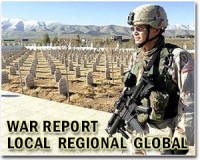| . |  |
. |
Ramallah, West Bank (UPI) Nov 24, 2010 Allegations by West Bank Palestinians that their U.S.-trained security forces regularly torture detainees have risen sharply in recent weeks and threaten to erode Palestinian support for the faltering peace process with Israel -- or worse. The Palestinian Authority's General Intelligence and Preventive Security units have rounded up more than 700 people in a crackdown on Islamist militants and their support groups following a deadly attack on Jewish settlers by Hamas gunmen in August. Human rights groups say just about all of them were arrested without proper warrants and held without the asset of judges or prosecutors under Palestinian law. Randa Siniora of the Palestinian Independent Commission for Human Rights, says there has been a sharp increase in the number of complaints about torture. "We're looking at a very gloomy situation," she said. "I'm afraid that this (torture and abuse) will become systematic." Diplomatic sources say that Prime Minister Salam Fayyad, who is highly regarded in Washington as a reformer, is unable to halt the alleged abuses because the Palestinian security services are firmly controlled by President Mahmoud Abbas. These services were created and controlled by Yasser Arafat, who died in November 2004, as his Praetorian Guard. They have been rebuilt since 2005, following two Palestinian uprisings against Israel, in a program directed and funded by the United States. Washington feared an Islamist takeover of the West Bank, as happened in the Gaza Strip in 2007. The man behind that program was U.S. Army Gen. Keith Dayton, who has overseen the training in Jordan of some 6,000 handpicked security personnel, vetted by the CIA, and their subsequent deployment across the West Bank. These forces have been able, along with Israeli troops, to virtually eliminate terrorist attacks on Israel, whose primary consideration in its dealings with the Palestinians is the security of the Jewish state. But many Palestinians are questioning the value of helping Israel curb terrorism while there's sign of it ending its 43-year occupation of the West Bank. Dayton, whose assignment ended in October, saw that problem coming. In May 2009 he warned that as Palestinian security forces were being built up so were expectations they would become the army of an independent Palestinian state. "With big expectations come big risks," he cautioned in a speech to the Washington Institute for Near East Policy, a think tank closely associated with the Israeli lobby in the United States. "There is perhaps a two-year shelf life on being told that you're creating a state, when you're not." U.S. commentator Robert Dreyfuss noted at the time, "To my ears, at least, his subtle warning is that if concrete progress isn't made toward a Palestinian state, the very troops Dayton is assembling could rebel." Given U.S. President Barack Obama's recent drive to pressure Israel and Abbas to start producing results in the peace process, Dayton's two-year warning seems to have slotted neatly into the White House's timetable. "The entire process" of the security buildup "is predicated on constant progress, however calculated and slow," observed Amos Harel, military commentator of the liberal Israeli daily Haaretz. "Without further forward movement, everything could collapse again within a year. Ongoing Palestinian willingness to prevent attacks (on Israel) depends largely on political progress." "There is a strong linkage between Palestinian security reform and the political process," said Shlomo Bron, a retired Israeli brigadier general and a senior research associate at the Institute for National Security Studies in Tel Aviv. "On the one hand, progress in security reform is a strong enabler of progress toward political agreement between the two sides. "On the other, viable Palestinian security reform is doubtful without a real Israeli-Palestinian political process that legitimizes it with Palestinian society and ensures it is not perceived as a purely political ploy by a failing Palestinian leadership that has no support in Palestinian society." Ghassan Khatib, director of the Palestinian government media center, warned, "For Palestinian officials to go on preventing what many Palestinians consider legitimate resistance to the occupation at the same time that the occupation is being consolidated will undermine the Palestinian government's public stand and put it in jeopardy." Palestinian psychiatrist Samah Jabr, a critic of the Palestinian security policy, makes no bones about it, saying, "The West Bank is becoming a police state."
Share This Article With Planet Earth
Related Links
 India boosts troop level near Tibet border
India boosts troop level near Tibet borderNew Delhi (UPI) Nov 24, 2010 India is readying two army divisions totaling more than 36,000 troops for deployment by March along a disputed northern border with China. The divisions are to defend against a possible Chinese attack on India's state of Arunachal Pradesh. But China, which roundly condemns the move, has been claiming for more 50 years that the area is part of its autonomous Tibet region. The inte ... read more |
|
| The content herein, unless otherwise known to be public domain, are Copyright 1995-2010 - SpaceDaily. AFP and UPI Wire Stories are copyright Agence France-Presse and United Press International. ESA Portal Reports are copyright European Space Agency. All NASA sourced material is public domain. Additional copyrights may apply in whole or part to other bona fide parties. Advertising does not imply endorsement,agreement or approval of any opinions, statements or information provided by SpaceDaily on any Web page published or hosted by SpaceDaily. Privacy Statement |